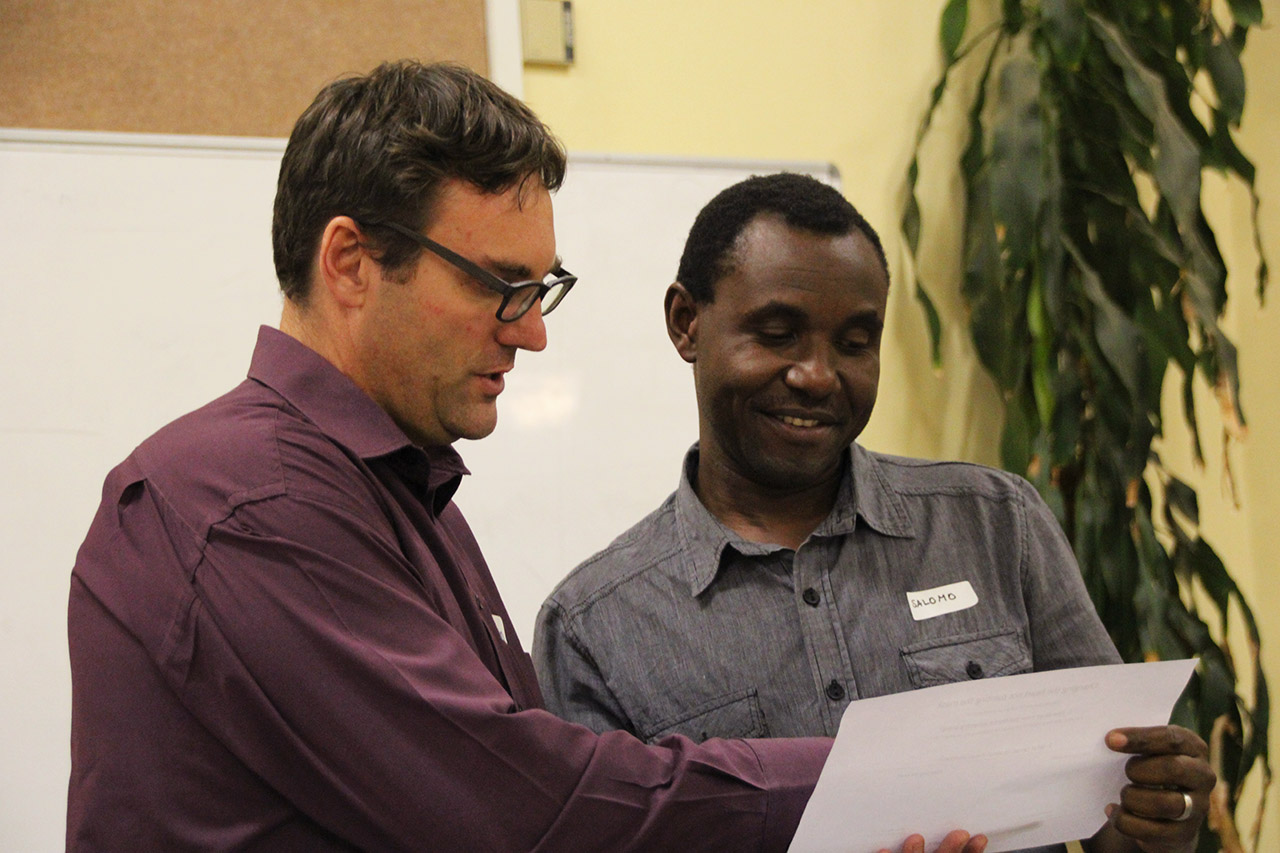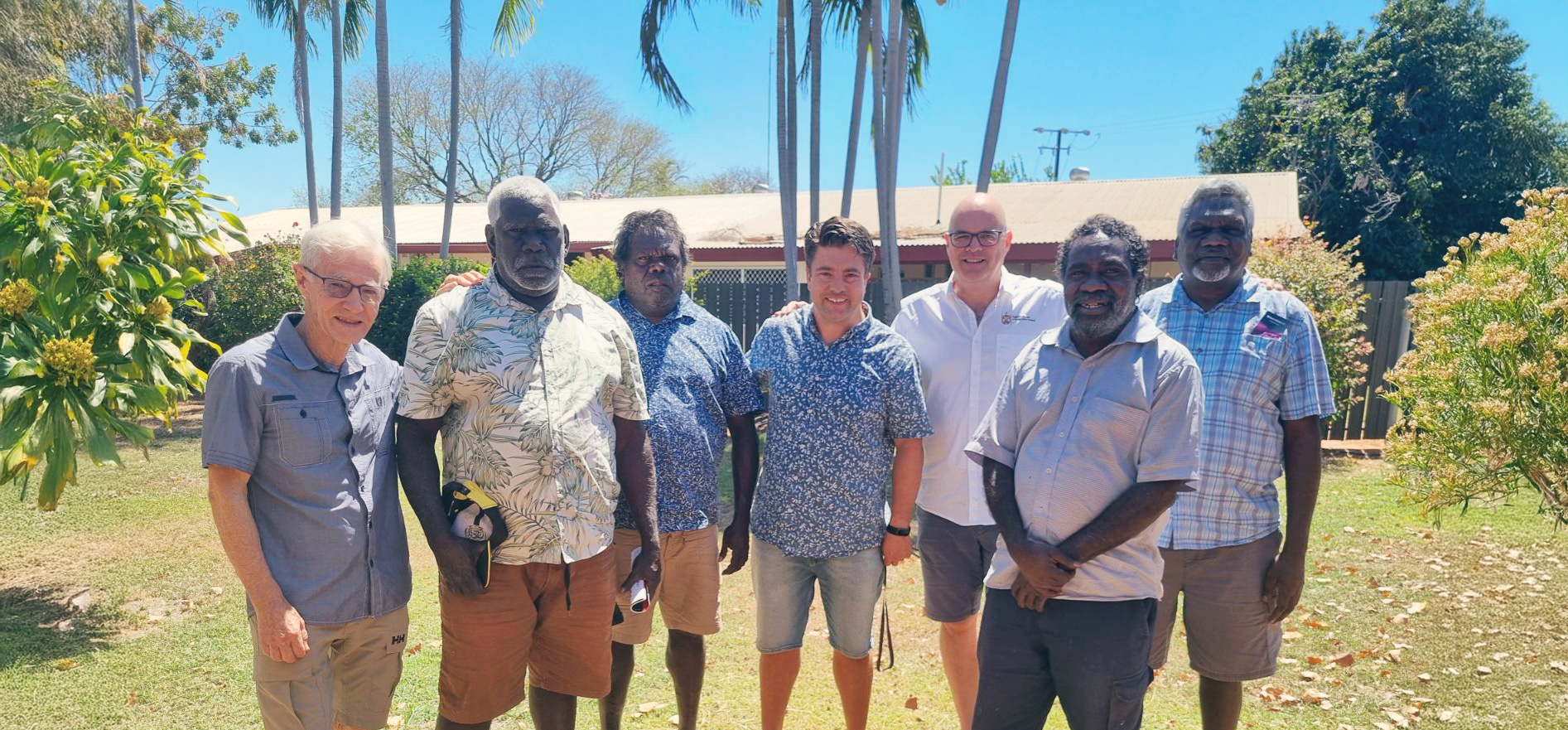Bible-based: Sword of the Spirit

Simon Gillham with a NETS student.
Hundreds if not thousands of Christian organisations claim to be Bible-based, including CMS. Does the term have any real meaning? Former CMS missionary Simon Gillham is now head of the Department of Mission at Moore Theological College. Here he gives an emphatic ‘yes’.
In a world of fake news, I found a new imposter in my fridge. Almond milk. At first glance it looked like milk, but closer inspection of the ingredients list revealed that it contained no milk and only 2.5 per cent almonds. 2.5 per cent. Is that even enough to say it’s ‘almond-based’?
In the Christian world there’s a similar claim that is far more significant: Bible-based.
Almost every church and mission agency claims to be Bible-based, but what do we mean by it? For CMS, it means at least two things. First, teaching the Bible is a central activity. Second, the teaching of the Bible provides CMS’s principles and priorities.
Our vision is for a world that knows Jesus, and all that we know of Jesus comes from the Bible. When someone speaks of Jesus, we can check what they say against what is written in the Bible. That is how we determine whether it is true (Galatians 1:6–9, Hebrews 13:7–9, cf. 2 Corinthians 11:4).
If people are to know Jesus, that cannot happen apart from engaging with the Bible. So, the work of CMS is Bible-based because there is no other way for the world to know Jesus or grow in knowledge of Jesus apart from the Bible. This is why all of our missionaries have formal Bible training, and why so many of our missionaries are involved in a great variety of Bible teaching ministries.
Broad implications
Being Bible-based has implications that go beyond mere focus on Bible teaching. For CMS, the Bible is the basis for our understanding of mission. It’s not that we expect to find a verse that will tell us which country to go to, or what our leadership structures should be. But we constantly spend time in the Bible and weigh all we do against it. We look to the Bible to give us priorities and principles to follow. Our understanding of the world, history, politics and people is shaped by what God says in the Bible. We are Bible-based because we constantly scrutinise the foundations of what we do and why we do it by the authoritative teaching of the Bible (Hebrews 4:12, 2 Timothy 3:16–17).
A continual challenge
It’s amazing how, even at a Bible school, remaining Bible-based is a constant struggle. There are constant challenges. At Namibia Evangelical Theological Seminary (NETS), we were sometimes offered funding and material to teach courses on novel hot-button topics of the day, but every decision to focus on these things would’ve left less time to teach the Bible. We also resisted the almost gravitational pull of tradition (to keep doing what we’d always done) by beginning every meeting of the students, the staff or the board by reading the Bible and praying together. The first thing you do together shapes the rest of what you do. Being Bible-based means that reading and hearing the Bible must become an automatic default setting.
If a claim to being Bible-based is going to mean more than being like ‘almond milk’, we have to make sure that the teaching of the Bible remains our central activity and primary guide.
A story from CMS missionaries
Quality matters
CMS missionary Nathan Lovell (with Diane) serves in South Africa where he is academic dean at George Whitefield College (GWC). He says: “Simple Bible courses are a good start. But if we want the African Church to grow in the way they are self-led, writing commentaries, setting up their own theological institutions, sending their own missionaries, and contributing to world Christianity, then they need opportunities to exercise their abilities at the highest academic levels.
“Deep study of the Bible serves the gospel in many ways, but two are worth special mention. Directly, it trains people in the kind of rigorous thinking that is so needed for leadership in Bible-based ministry. Indirectly, the ideas it generates trickle down into other teaching and training material. Where do you think the simple Bible courses came from?
“Africans have so much to offer the world Church. Let’s not deny them the opportunity to advance.”
For more of Nathan’s thoughts on how GWC’s new postgraduate program is benefitting the growing African Church, click here.
PRAY
There is continual pressure to move away from being Bible-based. Pray that Mike & Karen Roe (part of the NETS team with CMS) and Daniel & Olivia Webster (joining the same team) would remain faithful to Scripture.











































































































